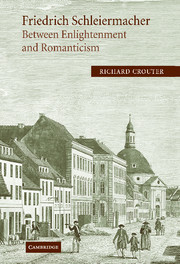Book contents
- Frontmatter
- Contents
- Acknowledgments
- List of abbreviations
- Introduction
- PART I TAKING THE MEASURE OF SCHLEIERMACHER
- PART II SIGNPOSTS OF A PUBLIC THEOLOGIAN
- 5 Schleiermacher's Letters on the Occasion and the crisis of Berlin Jewry
- 6 A proposal for a new Berlin university
- 7 Schleiermacher and the theology of bourgeois society: a critique of the critics
- PART III TEXTUAL READINGS AND MILESTONES
- References
- Index
5 - Schleiermacher's Letters on the Occasion and the crisis of Berlin Jewry
Published online by Cambridge University Press: 14 January 2010
- Frontmatter
- Contents
- Acknowledgments
- List of abbreviations
- Introduction
- PART I TAKING THE MEASURE OF SCHLEIERMACHER
- PART II SIGNPOSTS OF A PUBLIC THEOLOGIAN
- 5 Schleiermacher's Letters on the Occasion and the crisis of Berlin Jewry
- 6 A proposal for a new Berlin university
- 7 Schleiermacher and the theology of bourgeois society: a critique of the critics
- PART III TEXTUAL READINGS AND MILESTONES
- References
- Index
Summary
Just how and why Jewish emancipation into civil society came to be addressed in a set of six fictive letters by Friedrich Schleiermacher forms a complex but compelling story. How did a rising young Christian theologian within the Berlin Romantic circle come to use his gifts of satire, irony, and substantial insight into religion to address a sociopolitical situation with immense implications for Christians as well as Jews? If comparable moments exist in the history of Christian theology where a major theologian so directly (and constructively) engages the religious teaching and sociopolitical striving of contemporary Jews, they must be few in number. Of course, Schleiermacher's life (1768–1834) coincides with the era of democratic aspirations. The quest for universal rights of late eighteenth-century Europe, epitomized by the neighboring French revolution, had a great impact on Prussian, with a Jewish population many times that of France. Though French Jews (mostly living in Alsace) were emancipated in 1790 and 1791, it would take Prussia another eighty years to grant full civil and political rights to its Jews.
Eventually known as the premier theologian of modern Protestant liberalism and the translator of Plato into German, Schleiermacher served with distinction as teacher at the University of Berlin from 1810 until 1834. His youthful 64-page pamphlet, Letters on the Occasion of the Political-theological Task and the Open Letter of Jewish Householders (July 1799) has received modest attention in the scholarly literature.
- Type
- Chapter
- Information
- Friedrich Schleiermacher: Between Enlightenment and Romanticism , pp. 123 - 139Publisher: Cambridge University PressPrint publication year: 2005



